Table of Contents Show
You might have seen those incredible pictures of RVs covered in a blanket of beautiful white snow posted all over social media. Everything looks calm and peaceful–but the beauty doesn’t tell the whole story. There’s a lot you can’t see in those pictures about winter camping in an RV.
Let’s look closely at what they’re not telling you about winter camping. Let’s get started!
9 Things You Need to Know About Winter Camping
We’ve compiled the nine things you don’t hear when it comes to winter camping. Read these tips so you stay warm while camping this winter!
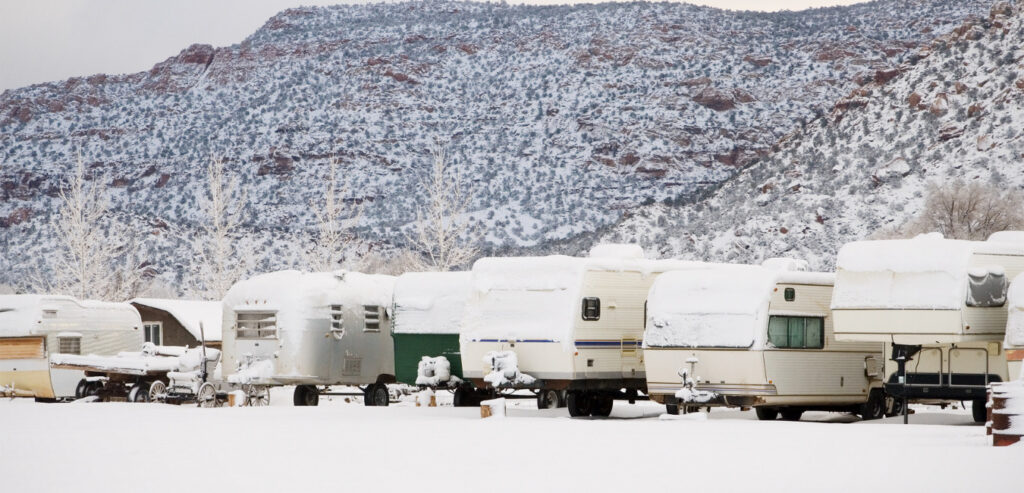
1. It’s COLD… Even in an RV
Even the most expensive RVs aren’t built like residential homes. The windows are often lighter, and there’s typically far less insulation in an RV. This means that staying warm will be difficult, especially during freezing temperatures.
You’ll want to make different preparations for the weather when winter camping. Dressing in layers, stocking up on propane, and even having a space heater can help you and your RV stay warm.
While keeping yourself and your fellow campers warm should be your top priority, consider the effects of cold weather on your RV as well. Keep reading for more on that.
2. Your Pipes Can Freeze and Burst, Just Like in a House
Your RV has a plumbing system that carries water from your freshwater tank or the water spigot outside. These essential pipes can burst or crack as the water expands while freezing. This can lead to costly repairs and frustrating damages.
Opening cabinets allows warm air to surround your pipes, keeping them from freezing. You can also protect your RV with heat tape and pipe insulation around your plumbing system for extra protection as well.
Many RVs with a four-seasons rating will have ducting in the storage bays. This ducting pumps warm air into the storage bays anytime the furnace runs, so it’s essential to regularly run your furnace when it’s cold. While an electric space heater or fireplace will keep your living space comfortable, it might not reach your storage bays, and your furnace must do the job of protecting your pipes.
3. Don’t Leave Your Waste Tanks Open
Whether it’s your black or gray tank, you shouldn’t leave them open. Leaving your waste tank valves open may save you a trip or two outside, but poop pyramids and food particles can easily collect in the bottom of your tanks.
Leaving your tanks closed helps ensure as many of these unwanted particles as possible get flushed out every time you dump your tanks.
Did you also know that leaving your waste tanks closed can also save you from issues during winter camping?
The more liquids in your tanks, the longer they can be exposed to freezing temperatures before freezing. A frozen tank can be frustrating and even require troubleshooting in less than ideal weather conditions.
Some RVs have heating pads wrapped around their tanks to keep temperatures above freezing, but even these heating pads work best with more liquid in your tanks.
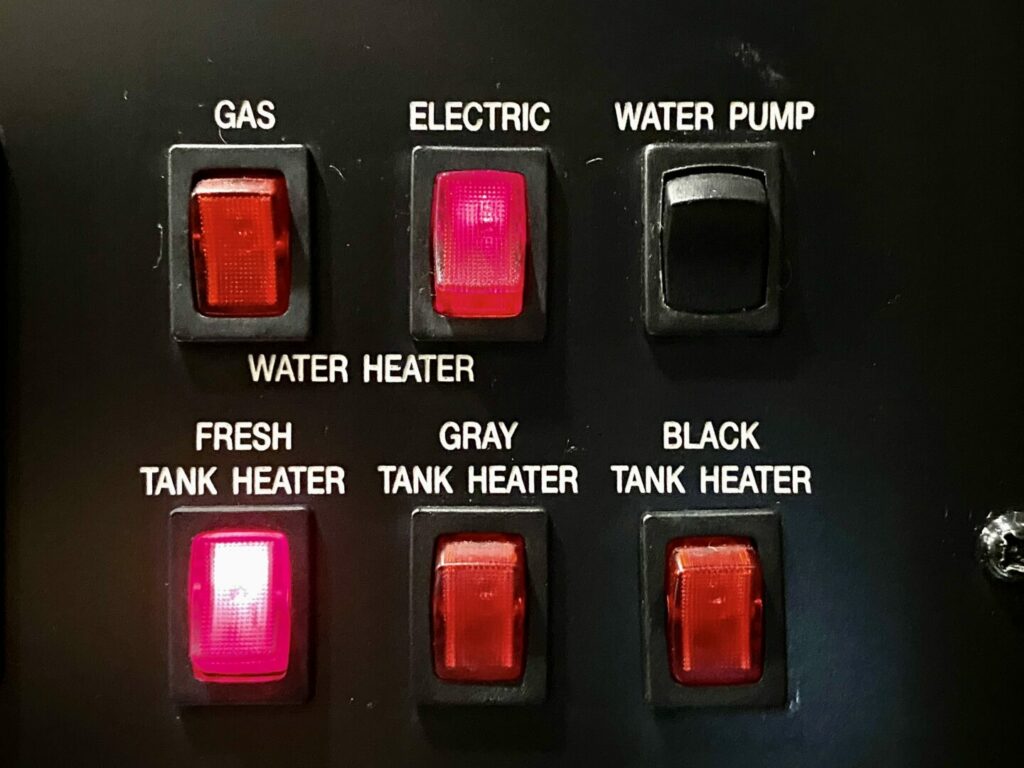
4. Propane Space Heaters Are Awesome
When it comes to generating heat, a propane space heater can produce significant heat. These heaters can quickly warm up your RV, and propane refills are often readily available and are relatively inexpensive.
One thing to keep in mind with a propane space heater is that when propane burns, it generates moisture, creating condensation. The humidity generally hides in places with minimal air movement, causing mold to form on the backside of mattresses, in drawers, and even inside closets.
If you plan to use a propane space heater or furnace, run a high-quality dehumidifier, too. You’re taking a major risk if you choose not to.
5. Stuck in One Spot? Skirt Your RV
If you’re spending the winter in one spot. You can help protect your RV and keep it warm by creating a barrier called a skirt around the bottom of your RV. There are even companies that make custom RV skirting based on your RV’s specific dimensions.
A custom option will be expensive, so many RVers use pieces of insulation board or bales of hay. Keep in mind hay bales tend to attract pests and other critters looking for a warm place. You may get a warm RV for your winter camping trip but end up battling a mice infestation.
6. Insulate Everything
As the temperatures drop, you’ll quickly notice the areas in your RV where cold air enters. This will include windows, doors, and skylights. You must adequately insulate these spaces to help keep the warm air in your RV and the cold air out.
If you have any rooms or spaces in your RV that you aren’t using, close off the room. Shut the doors and use a blanket to cover the crack under the door. That way, you don’t have to worry about heating those rooms, and you can use a space heater less frequently.
Pro tip: here are even more ways on How to Stay Warm in Your RV
7. Keep an Eye on Your Propane
Running out of propane in the middle of a freezing night is an awful feeling. The temperature in your RV will quickly drop, and you’ll likely find yourself putting on layer after layer to stay warm. When it’s freezing outside, and you depend on propane for heat, this can be a dangerous situation.
If your RV has multiple propane tanks, many RVers will only open one tank at a time. When they discover a tank has run out of propane, they’ll turn on the other propane tank and have the empty tank refilled as soon as possible. This helps avoid any chance of finding yourself entirely out of propane.
8. Test Your Carbon Monoxide Detector Regularly
While winter camping, you’ll likely use more heat sources that can produce carbon monoxide. This tasteless, odorless, and invisible gas is a silent killer. It’s often the result of burning gasoline, wood, propane, charcoal, or other fuels. If you’re in an environment where you need to use propane as a heat source, you must have carbon monoxide detectors.
Every new RV that rolls off a dealership’s lot must have a carbon monoxide detector. You can test yours by lighting a handheld lighter and blowing it out. While still pressing the trigger to release fuel, place it in front of the carbon monoxide detector.
If the gas goes onto the sensor, after a few seconds, it should trigger an alarm. If not, you can check the batteries or other power sources to ensure the carbon monoxide detector works appropriately.
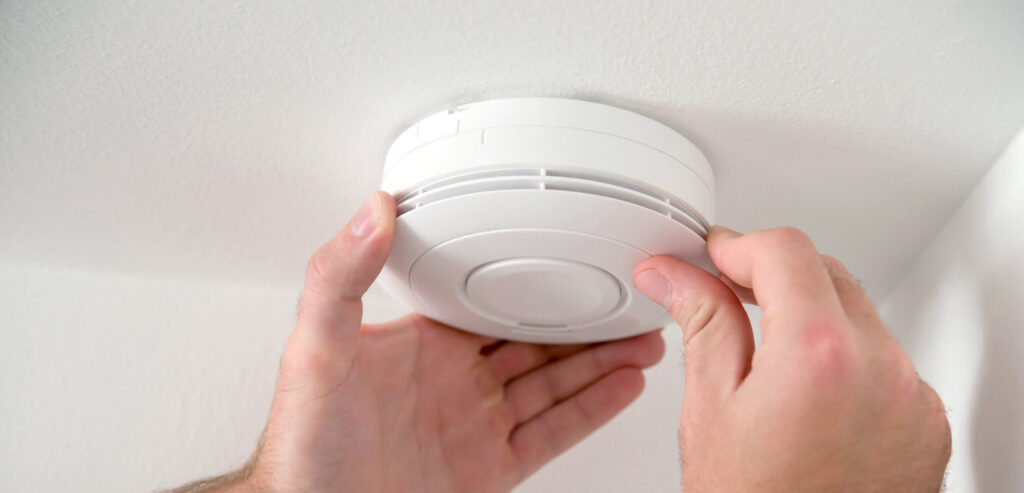
9. Don’t Use Extension Cords for Space Heaters
Space heaters use a tremendous amount of power, and not all extension cords can handle it. An overworked extension cord could start an electrical fire. Not only are electrical fires challenging to put out, but they could also burn up your RV in a matter of minutes.
While staying warm is essential, you don’t want to put your or others’ lives at risk. An RV fire is not the fire you want to stand next to when trying to get warm.
Winter Camping Can Be Cozy if Done Right
Winter camping can be a relaxing experience if you do it right. You can’t over-prepare for this. It’s better to have an extra blanket and not use it than to be without it when you need it.
You may fall in love with the peacefulness of camping while a blanket of snow surrounds you as long as you’re ready for it.
Have you ever camped in freezing conditions? If so, what tips do you have for staying warm that you’d share with other RVers?




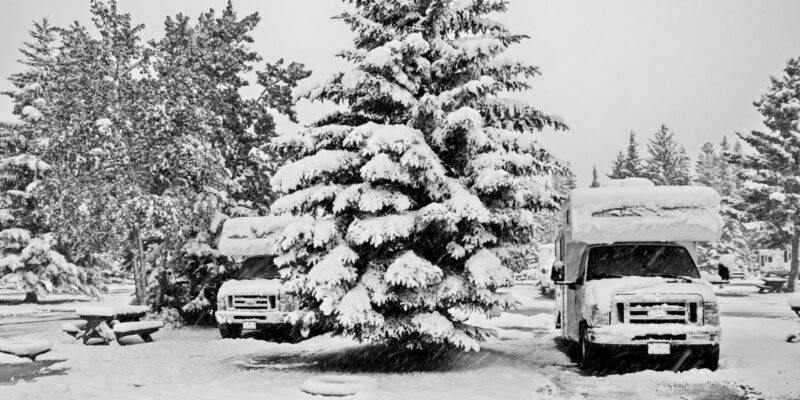

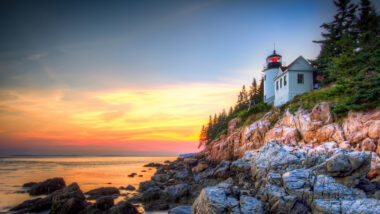
We winter camped every weekend…on our cross country skiis. We set up our tents,sleeping pads,winter sleeping bags ,build a huge fire…go moonlite skiing…return to base…have the dogs warm up our bags…have a bite..cocoa..and sleep…All done in the Black Hills…we were Never cold